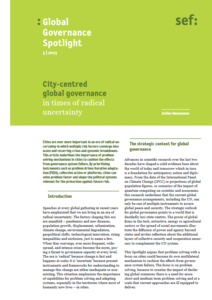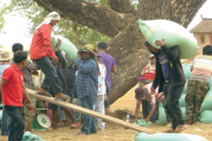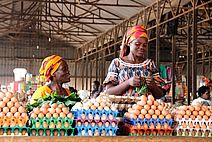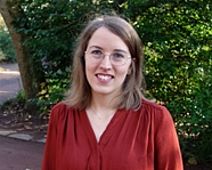|
|
|
Dear reader, |
|
|
| |
|
For the first time in its history, Germany has published a National Security Strategy. This strategy speaks of “integrated security”, i.e. it outlines a comprehensive concept of security that also considers issues such as climate change, food and energy security, migration and conflict prevention as relevant to Germany’s national security.
In his foreword, Chancellor Scholz emphasises the importance of partnerships “with the up and coming countries of Asia, Africa and America”. How exactly these partnerships are to be designed and what opportunities arise from this, however, is not further elaborated.
At the Bonn Symposium 2023, we will discuss the implications of the Security Strategy for Germany’s international cooperation with national and international experts from politics, academia and civil society, as well as how countries beyond the main global players, particularly in Africa, view the Strategy and how Germany can and should shape its relations with them in a partnership-based and sustainable manner.
You can register for the event here.
As always, you will also find further upcoming events and publications from sef: and INEF in this newsletter. We hope you enjoy reading!
Kind regards, Carolin Rosenberg,
Institute for Development and Peace (INEF) |
| Elena Harlos,
Development and Peace Foundation (sef:) | | | | |
|
|
|
| |
|
UPCOMING EVENTS
|
 © shutterstock/gopixa |
sef: Policy Lunch
16 November 2023, 12:30 hrs, Brussels
The number of refugees and migrants to the EU has increased significantly in recent months. It is to be expected that this number will continue to rise in the near future. Many people in Europe see the continent's absorption capacities exhausted; at the same time, Germany and other EU member states have an increased need for a regulated immigration due to labour shortages in many economic sectors.
One way in European migration policy aims to prevent migration already outside the EU borders and thus to outsource the problem to a certain extent. One instrument for this is migration partnerships with third countries, such as Tunisia, which have met with harsh criticism from civil society organisations. Nevertheless, the EU is planning further such agreements.
In this Policy Lunch, we will discuss with our experts whether such partnerships have the potential to contribute to a just asylum and refugee policy in the EU. How must such partnerships be designed to fulfil Europe’s aspiration to regulate immigration more tightly, while simultaneously guaranteeing the protection and humane treatment of migrants and refugees?
Here you can register for our event in Brussels.
|
 |
 © Bundesregierung/Denzel |
Bonn Symposium
23 November 2023, 10:30 hrs, Bonn, Deutsche Welle
Germany's first National Security Strategy was eagerly awaited. What does the strategy mean for Germany's international cooperation and how is it perceived in other parts of the world? These and other questions will be discussed at this year's Bonn Symposium with national and international experts from politics, science and civil society.
You can find the link to the registration and the current programme here.
|
 |
 © Martin Wolf / KHK |
Final conference of the Käte Hamburger Kolleg / Centre for Global Cooperation Research
8-10 November 2023, Duisburg
Founded in 2012 as the 10th Käte Hamburger Kolleg on the initiative of the German Federal Ministry of Education and Research (BMBF), the Centre for Global Cooperation Research in Duisburg established an interdisciplinary Denkfreiraum ('Open Space for Thinking'). At its final conference the Centre will provide a moment to reflect on the research accomplished as well as evaluate, with colleagues, current and former fellows and other acknowledged experts the gains and promises of a research field that to some extent took shape at the Centre.
The full programme and registration link are available here.
|
|
PUBLICATIONS
|
 |
Global Governance Spotlight 3|2023
Cities are ever more politically important in an era of radical uncertainty in which multiple risk factors converge into acute and recurring crises and systemic breakdowns. In our latest Global Governance Spotlight Dr Wennmann underlines the importance of problem-solving mechanisms in cities to cushion the effects from governance system failure on the national level. By prioritising instruments such as problem driven iterative adaptation (PDIA), collective action or platforms, cities can solve problem faster and shape the political systems relevant for the protection against future risk. He argues that problem solving with a focus on cities could become an independent multilateral mechanism.
|
 |
 © The Economic and Labour Relations Review |
New Article in „The Econonic and Labour Relations Review”
Can workers use new digital communication tools to improve labour standards along global supply chains? In a new article for The Economic and Labour Relations Review, authors Christoph Sorg (Humboldt-Univ. zu Berlin), Carolina A. Vestena (Univ. Kassel), Sabrina Zajak (DeZIM Berlin) and Christian Scheper (INEF) provide an overview of the growing field of digital feedback infrastructures for workers in global value chains. The paper looks at the main features of over 50 tools and divides these into management-oriented and worker-centred approaches.
|
 |
 © Frank Bliss |
AVE Good Practice 25b
Agricultural cooperatives in Cambodia and their contribution to agricultural finance are the subject of AVE Good Practice 25b. The publication examines the background, conditions for success and challenges of the provision of agricultural credit and inputs through cooperatives.
The publication is part of the INEF project “Pathways out of Poverty, Vulnerability and Food Insecurity“ (AVE), which is funded by the German Federal Ministry for Economic Cooperation and Development (BMZ).
|
|
RESULTS AND REPORTS
|
 © shutterstock.com/Sarine Arslanian |
Potsdam Spring Dialogues
Conference Report
As a result of the war in Ukraine, global supplies of staple foods have declined and trade and transportation costs have increased, contributing to a dramatic increase in food prices. Of the various regions affected by these developments, Sub-Saharan Africa is particularly hard hit, with households spending up to 50 % of their income on food. Against this backdrop, the Potsdam Spring Dialogues brought together African and European experts from politics, civil society and academia to discuss possible strategies against food insecurity and the contribution that governments, international and regional organisations as well as business and civil society can make.
The conference report is now available on our website.
|
|
SEF:/INEF INSIDE
|
 © Maruf Rahman / Pixabay |
New research project at INEF
For many years, there has been an international debate on adverse environmental and human rights impacts of transnational supply chains. A new project funded by the Hans Böckler Foundation examines strategies for mobilising the law under the concept of legal struggles, e.g. in the context of strategic lawsuits or the interpretation of the new German Supply Chain Act (Lieferkettensorgfaltspflichtengesetz, LkSG), which came into force in January 2023.
The project is carried out by INEF researchers Christian Scheper and Anne Engelhardt in cooperation with the University of Kassel and the RheinMain University of Applied Sciences.
|
 |
 © Rafael Bohlen |  New staff member at the sef: New staff member at the sef:
Rafael Bohlen joined the sef team on 1 October as a research and programme officer. Rafael holds a master’s degree in social science and has completed study visits at the Ruhr University Bochum, at the Colegio de la Frontera Norte in Tijuana, Mexico, and as a Fulbright Fellow at the City University of New York. Most recently, he served as research associate at Ruhr University and as consultant at the United Nations Office on Drugs and Crime (UNODC). He is substituting for Ingo Nordmann-Mohn during his parental leave until June 2024. |
 |
 © Anne Engelhardt |
In October, Anne Engelhardt joined INEF as a researcher in the project "Legal Struggles in Transnational Supply Chains". She completed her PhD at the Kassel University in the field of politics and globalisation and works on logistics, chokepoints along supply chains (especially ports and airports), occupational health and safety, labour conflicts, transnational trade union organising, social reproduction and ecological transformation with a regional focus on Brazil and Portugal. |
 |
 © Carolin Rosenberg |  New co-editor for the newsletter New co-editor for the newsletter
In October, Carolin Rosenberg took over as co-editor of sef:/INEF News. She has been a researcher at INEF since January 2023, focusing on food security and the promotion of smallholder agriculture in Sub-Saharan Africa. |
|
|
|
|
|
The Development and Peace Foundation (sef:) was founded in 1986 on the initiative of Willy Brandt. It is a cross-party and non-profitmaking
organisation. sef: provides an international high-level forum for shared thinking on the complex challenges of globalisation. It is linked to the
Institute for Development and Peace (INEF) by a cooperation agreement. The aim of INEF’s application-oriented research is to build bridges
between theory and practice. It is one of three host institutions of the Käte Hamburger Kolleg / Centre for Global Cooperation Research.
|
|
|
|













